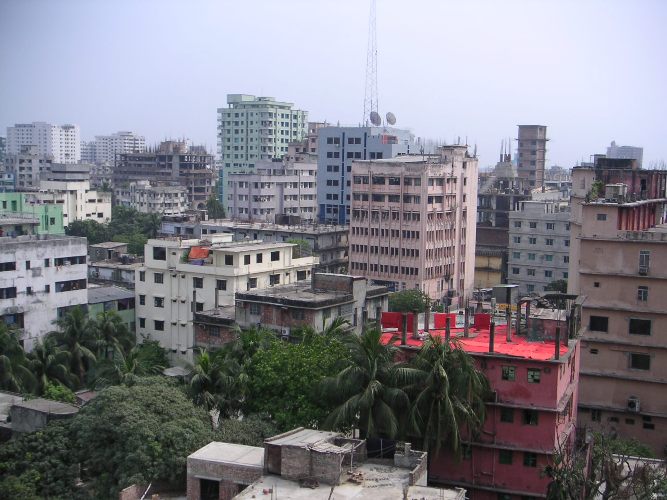
Venturing out in a Bangladeshi metropolis one meets an incredible traffic system. It accommodates all modes of transport, from man-pulled rickshaws or goods-carts (thelagari) to the latest Audis. If this strikes you as impossible, the dexterity with which these vehicles avoid collisions on inadequate roadways would alarm you. If you are impressed by the prowess of the drivers, the courage of the pedestrians – some elderly, on walking sticks, pleading with traffic to slow down (or to swerve, sparing them), as they struggle towards the other side — could inspire you. Even to cross a road people have to take unreasonable risks.
Yet this summary of the dangers of ordinary life merely depicts the perfunctory perils of the place. More menacing threats could compromise, even jeopardise, one’s living and livelihood. In 43 years of independence, citizens can barely remember ‘independent’ living. While the follies of the founder and subsequent despots curbed freedom in the first two decades, deadly bickering between their successors in the latter two decades has ensured that no-one dares exercise their right to freedom of speech. If the generals of yesteryear forced outspoken editors into exile, the subsequent autocrats-disguised-as-elected PMs hounded and harassed them. Each regime was innovative in its approach, and that isn’t much of a task with a judiciary that is far from independent.
Now that these methods are well known, a relatively new way of suffocating free-thinking is emerging. Bloggers have been named, shamed and openly persecuted on social media, before being mercilessly hacked to death in public on the busy streets of the capital. The attackers are remorseless, demonstrating iron-clad conviction, aiming largely, it would appear, to establish zero tolerance of atheists or infidels.
Conspiracy theories are abuzz. Why haven’t the authorities been able to get to the bottom of these cases? There have been arrests but legal proceedings remain slow. It could be that the administration is under-resourced or not skilled enough to investigate and build evidence quickly. But then we were told that in one prominent case foreign investigators including the FBI were assisting local authorities. They may well have found clues and made headway in their investigation, but, except for an early arrest, we have heard of no further development on the case.
As it is, to demand, criticise or voice any doubts against the authorities – on issues ranging from a planned coal-based power plant in a world heritage listed mangrove forest, a disastrous oil spillage in its waterways, or the number of deaths during the war – is extremely dangerous. Do it at your peril. Reputable outlets such as The Economist and the New York Times have been summoned to explain their reports and analyses of these events.
And in which instances do you choose to stick out your neck? Since 2012, there have been the Rana Plaza and other RMG factory catastrophes; mysterious disappearances, including of two MPs; the unexplained killing of a couple, both journalists, front of their toddler; a chilling assassination in Narayanganj; atrocities against minorities including the destruction of Buddhist and Hindu temples, coercion around elections, and the ongoing sufferings of the indigenous people in the Chittagong Hill Tracks.
This list may not be all-inclusive, nor does it mention casualties such as the killing of Biswajit, the murders of competing political goons by mob lynching, the countless victims of petrol bombs or routine causalities in transport accidents. These mishaps are seen as sheer accidents and something for which the nation has no cure.
Perhaps, with our ever-diminishing memory span, a comprehensive list could generate a collective outcry which is currently absent, subdued or fatigued by the frequent fatalities.
Our extraordinary resilience in withstanding natural or man-made calamities is further applauded as we maintain solid economic growth, and receive national and international accolades in arts, sports and social development indicators. Apparently we are on course to be a much bigger and more flourishing economy in the coming decades. There are eye-catching phrases to get us involved in the journey. Increasingly the children of the middle classes and those living in the diaspora go on to higher education.
Yet, like the west or other developed economies, we tend to leave the disadvantaged further behind. An already unequal society becomes even more disparate. Businesses and politics have always had to work together but their amalgamation is purposeful now. The influence of business over politics has become more palpable. In the last two decades businessmen not only entered party politics, they now control public space through acquired media. In turn, what is tolerated – as valid protest, criticism or constructive discussion – and what is shunned– as incitmen, sedition or blasphemy – has been arbitrary. Successive governments’ increasingly harsh media, telecommunication and press laws mean that the space to air dissent is diminished.
It will be argued, of course, that economic freedom takes priority over freedom of thinking or expression, in particular for a developing country with a huge, poor, divergent population. North Korea, China, Russia — more moderate but equally brutal Singapore — are showcased as prosperous, happy and economically developed nations who muzzle free speech as state routine.
Still, historians, scholars, social and political scientists continue to emphasise the need for tolerance and a genuine ability to accept different opinions, which may remove the need to kill one another.
Meanwhile there isn’t any guarantee of rapid trial and punishment of the culprits, with politicians busy tightening their ideological grip and ensuring loyalties, while the masses are preoccupied with their daily demands, leaving a chill to set in.
Rehuma Rahim* (a pseudonym) is a political analyst